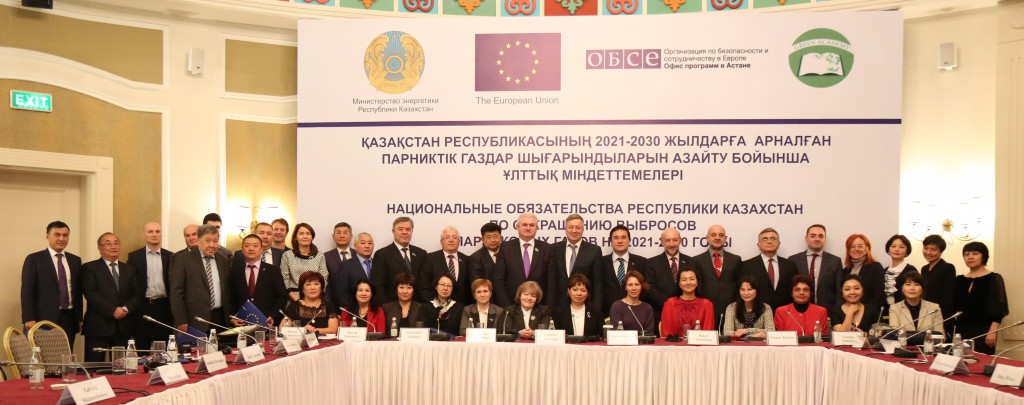
Participants of the Oct. 12 round-table discussion of Kazakhstan’s Intended Nationally Determined Contribution (INDC) for the Paris Climate Change Conference.
ASTANA – The role of Parliament emerged as a major theme at a roundtable discussion in Astana Oct. 12 on Kazakhstan’s Intended Nationally Determined Contribution (INDC) ahead of the Paris Climate Change Conference, as officials and experts from Kazakhstan and the EU discussed Kazakhstan’s voluntary commitments regarding climate change and created recommendations for the country on reaching its goals.
The Paris conference in early December – the Conference of the Parties to the UN Framework Convention on Climate Change (COP 21) – must achieve a new global agreement on climate change, applicable to all countries, that aims to keep the global temperature rise to less than 2 degrees Celsius, according to conference organisers. Kazakhstan’s INDC is to unconditionally reduce its greenhouse gas emissions by 15 percent by 2030, compared to 1990 levels, and includes a conditional target of reducing emissions by 25 percent by that date.
“These are rather ambitious commitments, which will require the adoption of comprehensive measures to purify that national economy by decarbonisation measures, the introduction of innovative green technologies and the development of the national carbon market,” said Minister of Energy Vladimir Shkolnik in his opening remarks at the discussion.
To implement the INDCs between 2021–2030, the conference recommended improving state monitoring and reporting of greenhouse gas emissions, introducing low-carbon technologies in all sectors of the national economy; creating a concept for developing Kazakhstan’s forestry industry in light of carbon depositing and the adaptive capacity of forests; expanding international cooperation with global green funds to attract research and investment; improving the emissions trading system, including reporting and transparency issues; proposing public hearings on improving green economy legislation; and conduct information campaigns on the INDC and COP 21.
It was suggested by a representative from the GIZ office in Kazakhstan that the recommendation to create a strategic document covering all areas of the transition to a green economy be added. Other suggestions included abandoning carbon emissions trading in favour of focusing on renewable energy and forestry and fishery support.
Ambassador of France to Kazakhstan Francis Etienne noted in his opening comments that to succeed, COP 21 needs political solidarity in the cause of preventing a temperature rise “expressed in a universal commitment to a universal cause, binding us all;” a solid agreement bound by proper legislation and regulation (on this, “Parliaments will have, everywhere in the world, a key role,” he said); and financial systems to help the transition. COP 21 envisions a $100 billion fund to support green economy development, with more than $60 billion pledged already, he noted.
Kazakhstan’s commitment, and its potential climate impact, was called “huge” repeatedly during the discussion. “The adoption of national commitments by Kazakhstan, a reputable and responsible member of the global community, will contribute to the struggle to curb the pace of global climate change,” said head of the EU Delegation in Kazakhstan Traian Hristea in his opening remarks.
Hristea echoed the importance of passing legislation to adapt to climate change, a theme picked up by other speakers. “I hope that members of the Parliament will meet the expectations of the public by ratifying relevant legislation. This is in the best interests of the society and a new stimulus for future investments in time of the diversification of economy,” Hristea said.
Kazakhstan’s lower chamber of Parliament is considering changes to the ecological code aimed at transitioning to a green economy, Shkolnik mentioned, including the functioning of the national system of emissions training.
Director of the Centre for Environmental and Natural Resource Economics at Russia’s Higher School of Economics Georgiy Safonov pointed out that Kazakhstan has already decreased its greenhouse gas emissions by 26 percent since 1990 and saved almost 3 billion tonnes of carbon dioxide in the process. “The contribution of Kazakhstan in the mitigation of climate change is huge and there is a huge potential for further decreasing this impact,” he said.
Sergei Tsoi, deputy director general of Zhasyl Damu, which administers the emissions trading system in the country, noted that the organisation would be focusing on improving monitoring and reporting systems. The use of quotas has caused confusion in the first two pilot years of the programme and better monitoring and a more stringent approach to providing additional quotas are needed. Both need to be supported by legislation. A draft plan is under consideration now for 2016–2020, which he notes will not be a pilot, but a “serious effort” at creating a working programme.
To meet its goals, Kazakhstan will need to increase the price of carbon emission quotas and reduce the current national plan of emissions quotas by half, said Asset Magauov, general director of the Executive Committee of Kazenergy. The country needs to focus mostly on implementing the national programme of energy saving and energy efficiency in all sectors involved with electrical power.
In his concluding remarks, Shkolnik called for more international technology and experience exchange on energy-saving. Kazakhstan spends around 400 kilogrammes of oil per unit of gross domestic product, he said, while developed countries spend more like 100–200.
Kazakhstan must move away from dependence on fossil fuels and upgrade its economy if the country is to reach its goal of becoming one of the 30 most competitive countries, he said. To become more competitive, the energy intensity of the country’s gross domestic product must be reduced.
“And when we are saying we need to reduce emissions, of course it’s unequivocal – because our products will not be bought,” Shkolnik said. “Under EU legislation, products that don’t meet environmental standards are banned. So if it’s not [environmentally friendly] a product cannot be sold in the EU. Industry cannot be competitive; our country cannot be competitive if it’s not environmentally friendly. It’s just not possible, by definition. That’s the truth. That’s the work that we are talking about. … Whether we want it or not, these tasks must be implemented.”
